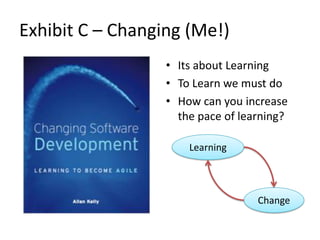Do itright
- 1. allan kelly Twitter: @allankellynet http://www.allankelly.net Do it Right Then Do the Right thing NDC Oslo June 2013
- 2. Allan Kelly 97 Things Every Programmer Should Know Henney, 2010 Context Encapsulation in Pattern Languages of Program Design Volume 5, 2006 Business Analysis and Leadership: Influencing change Penny Pullan & James Archer 2013 Consulting software development & strategy Training for Agile Author – Changing Software Development: Learning to be Agile (2008, Wiley) – Business Patterns for Software Developers (2012, Wiley - ISBN: 978-1119999249)
- 3. Management commandment Do the Right Thing Then Do it Right I am here to challenge
- 4. I am not saying Knowingly do the Wrong Thing I am saying You only know the Right Thing by doing
- 5. Exhibit A - The Alignment Trap Less Effective More Effective Highly aligned Less aligned ‘Alignment trap’ 11% companies +13% IT spending -14% 3 year sales growth ‘Maintenance zone’ 74% companies Avg IT spending -2% 3 year sales growth ‘IT Enabled growth’ 7% companies -6% IT spending +35% 3 year sales growth ‘Well-oiled IT’ 8% companies -15% IT spending +11% 3 year sales growth Source:Shpilberg,Berez,Puryear,Shah: MITSloanReview,Fall2007 1 2 Doingtherightthings Doing things right
- 6. Doing the right thing… • Costs – Money: £consultants, $analysts, €managers – Time: Analysis, research, meetings, discussions • Assumptions – There is a right answer – And it is knowable – No value in wrong answer – That wrong & right are definable
- 7. Exhibit B – Lean Start-Up • Knowing is difficult • Get into the market to find out • See what people will $pay for – Not just what that €say • Doing need not be expensive
- 8. Exhibit C – Changing (Me!) • Its about Learning • To Learn we must do • How can you increase the pace of learning? Learning Change
- 9. Exhibit D – He who learns fasters “We understand that the only competitive advantage the company of the future will have is its managers’ ability to learn faster than then their competitors.” Arie de Geus, The Living Company 1988
- 10. How do you learn fast? • Do • How do you do? • Iterate – Iterate faster – Iterate more • Learn • Learn to iterate faster, learn to aim better
- 11. Ready, Fire, Fire, Fire, Aim, Fire, …
- 12. Choose your weapon M16 from Dragunova via WikiCommons, Creative Commons License L115A3 from Defence on WikiCommon Open Government License
- 13. Or is your choice more like…. M16 from Dragunova via WikiCommons, Creative Commons License Berdan Sharps rifle via WikiCommons, Public Domain image
- 14. Which are you? Your delivery (supply) side? Your business (demand) side? (Ever heard about the M16 delivery team coupled with a 19th century requirements process?)
- 15. Choose your weapon Snipers Rifle • Known target • Clear shot • Time to prepare • Limited variables Machine Gun • Many targets • Confused environment • Time short – Action required • Many variables • Frequently miss
- 16. Choose your approach Sniper development • Market is slow moving • Market it known • Competitors are slow • Capital is scarce • Development is expensive • Risk of collateral damage, e.g. brand, individuals Machine development • Market is fast • Market is changing • Competitors are fast • Capital is cheap • Development is cheap (and fast) • Multiple failures, try again
- 17. Or do tools dictate approach? “It takes a long time to reload and aim” Therefore “take time to make sure every shot counts”
- 19. Asymmetric warfare You Your competitor Result Stalemate Toast! Toast! (Slow) ? ?
- 20. Iteration is the key • Get good at iterating • Get good at iterating fast • Get good at learning from results – Test results with customer – Test output in the market – And Evaluate Close the loop – evaluate what you do & feedback
- 21. Let a thousand flowers bloom… Get good at selecting those to keep - Cull the rest
- 22. Breaks are good • Get good at…. – Knowing when to stop – Stopping • Technical has TDD, ATDD, BDD to stop • Corporate breaks – Portfolio management – Venture Capital funding model – Use a Dragon’s Den
- 23. You can’t see the future… • You can’t know what will work • Stop wasting time and money guessing • Get good at probing – experimenting • Conduct a lot of experiments • Learn from experiments • Stop those which “don’t work” • Promote those which do
- 24. Iterate at all levels Regularly Evaluate -> Set/change direction Frequently Collect next -> Decide next Most frequently Developer -> Release • Build capability to iterate – and USE IT • Use data gained from iteration • Iterate your way to to The Right Thing
- 25. Allan’s commandments #1 Do it Right, Do it Fast; Learn & Iterate #2 Fail fast, Fail Cheap; Evaluate, Learn #3 Invest in breaks; Stop & Turn
- 26. Take-away 1. Fast iterations allow for learning – Learn to iterate fast – Then iterate in the market – Learn to evaluate & feedback 2. Fail fast, fail cheap, learn 3. Invest in breaks allan kelly Software Strategy Ltd. www.allankelly.net allan@allankelly.net Twitter: @allankellynet


























